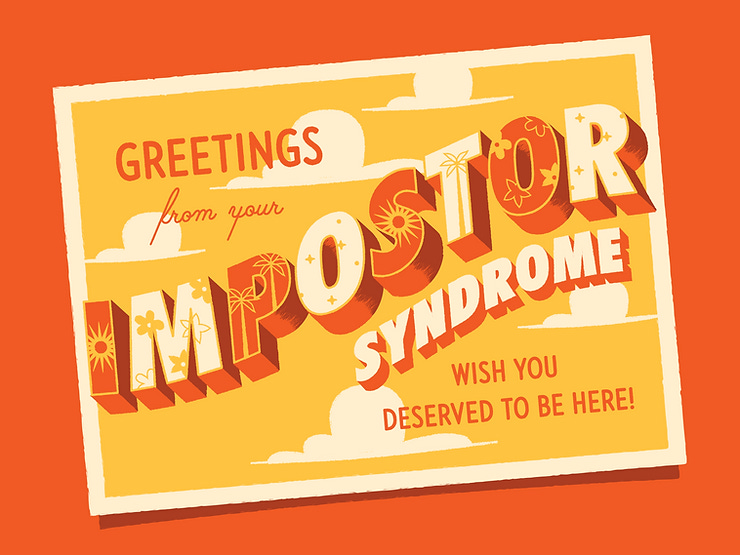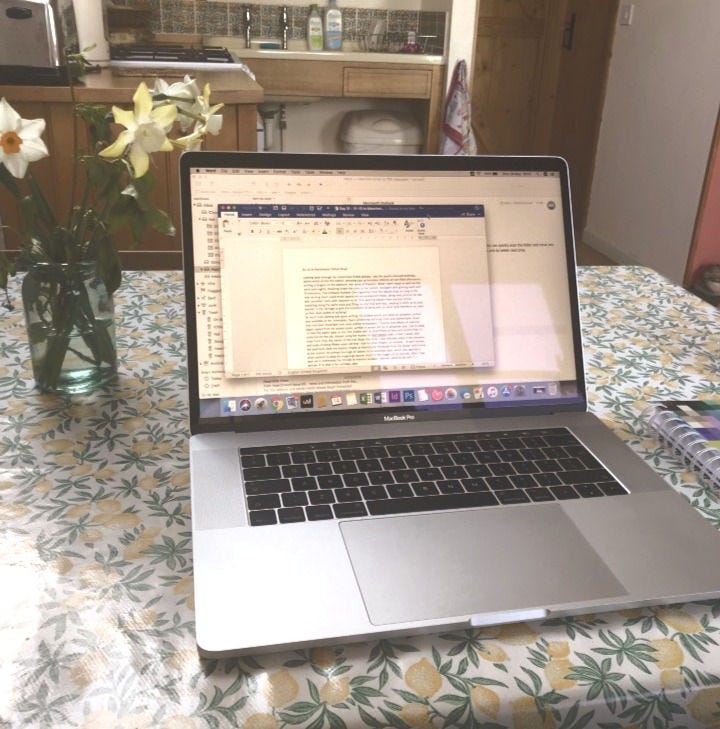Who the hell do you think you are?
Wanting to write and feeling unable; is there a worse torment? Imposter syndrome is a form of literary waterboarding. What does it take to break-out?
Hi, I'm Nat, and I'm a fraud. No, not the kind that scams nanas on Facebook or pretends to be a Nigerian prince. I'm an imposter writer. Don't worry; it's okay to laugh. I've made peace with my condition, and I'm embracing it.
You see, I've been working as a professional writer for years - journalist, feature writer, PR specialist, copywriter, etc. - but I always had doubts about my ability to write fiction. So, I avoided building any writing habit and left that stuff to real writers while I sulked somewhere in the background. I even considered getting a tattoo that said: "Fake it 'til you make it," but I chickened out at the last minute.
It was time to grab my love of fiction by the balls
and shake off my self-limiting beliefs.
I'd heard of the #100daysofwriting challenge, originated by my former mentor - Jenn Ashworth, and loved the idea of cultivating a daily writing habit. Daily deadlines coupled with the daisy-chain effect appealed to my serious work side, which always required deadlines.
Attacking the symptoms of imposter syndrome
I knew it was time to directly attack the symptoms of my Imposter Syndrome, end the faffing and go gung-ho for this habit-forming experience.
I'd need the perfect Christian Lacroix notepad, brushed-steel Schaeffer pen, sparkly office-in-the-garden, and Instagrammable setting first, of course…
Or perhaps I just needed to sit my arse down every day for 100 days, as the very act of 'turning up' is, as I was about to discover, as much about being a writer as bashing out 6,000 words a day until my fingerprints blurred.
I settled on a hidden cabin in the Welsh valleys, perfect for a self-indulgent (faffy) writer like me. And so, I made a deal with myself - all writing activity counted, whether small or insignificant. Whether it was a sentence, 3,000 words, a short story, or just figuring out a knotty plot on multi-coloured post-it notes, it all counted towards a day of having written. Even reading about characterisation/narrative counted. I was a writing ninja.
A commitment and a challenge
Of course, there were days when I faced a blank screen/page/mind devoid of creative juices. On those days, I set a timer for 25 minutes and freewheeled with anything that came to mind or worked with one-word prompts to kick-start the word flow. Often that's all it takes. It's like jump-starting a car, but for your brain.
A great prompt for this is: what I don’t want to write about it… Then go!
"There were days when I faced a blank screen/page/mind, devoid of creative juices."
I need prompts, deadlines and accountability to beat off the anticrastination (it's a real word). Attempting to reach a goal can be an insurmountable pressured task (zero-fun). Breaking the goal into bite-sized (fun-sized) pieces helps overcome a mountainous job.
I'm also the least likely to sing about achievements, which is a shame because I've had some small successes along the way. Being longlisted and shortlisted for lit sites, flash fiction competitions, and schemes was virgin territory for me. But with each successful submission, the hum of my Imposter Syndrome decreased - no matter how small the win.
Developing a personal routine
As a natural night owl, I’d take my daughters for a walk, tuck the dog into bed (or is that the other way around?), choose a Spotify music *soundtrack, and settle down to work. On other days I'll catch 20 minutes in a wi-fi-less café and scribble in a notepad (disclosure: any brand of notepad will suffice - trust me, it’s all bullshit).
If it's a tough day with little space for physical writing, I make notes, sketch out a character vignette or spend ten minutes thinking through development in my novel, but it all counts – and this perspective has been essential to the success of my 100 days challenge.
A few fellow writers joined me and we checked in daily as an extra layer of accountability. We moaned, stressed, celebrated and drank virtual wine whilst exchanging sweary rants and links to articles and thoughts.
Here I found my fellow imposters. Grasping blindly at stationery and looking worried. They turned out to be a bunch of prolific and impressive writers – who knew? They didn't!
On every tenth day of my challenge, I channelled my inner Beyoncé and forced myself to put a ring on it by submitting pieces to lit sites, flash fiction competitions, and schemes. It was like taking my writing virginity all over again. But, lo and behold, I started getting some love back! I was longlisted, shortlisted, and even made it to the "it's complicated" stage with a few competitions. With each success, my Imposter Syndrome shrunk like a flaccid balloon. Even if it was just a small win, I celebrated like I won the Pulitzer Prize (in my head).
“…with less than an hour left of my Day 100, I already know my story continues.
I'm riding the roller-coaster to the bitter end and moving
on to my next challenge #ayearofwriting.”
(written on my 100th day)
In my own experience, there’s no secret potion, magical spell or A-B-C process to writing, the obstacle is with you (unfortunately — it’d be much easier if it were something you could have removed by your GP). I’m always happy to be wrong about this, but until then…
Give yourself the break you deserve, stop over-thinking, and offer yourself a peg-up to be creative without judgement and pressure.
My mentor, Heidi James’ words landed: “Learn to play with your creativity again and you’ll open up a whole joyful world of your uniqueness.” How could that ever be wrong?
There is a future version of yourself who is impatiently waiting to work on the edit of your first draft.
**UPDATE: since writing this blog post originally for Prolifiko, I've completed a first draft of 80,000 words towards my memoir, started work as a content editor for two magazines, launched this Substack and have written every day for more than 1,860 days.
Do I feel less of an imposter though?
Not a chance.
(and trust me on the notebooks…)
Music to write:








Hi Nat,
A 100-day challenge sounds both fun and torturous (ok, 'torturous' is a bit of an exaggeration. 'Difficult' is better-suited perhaps). I would love to do something like that - maybe I should? - but I am worried about work getting in the way and me being frustrated about failing. It is good to hear that for you lots of things counted towards the challenge.
Funnily enough, I have started looking into literary prizes. Yet, imposter syndrome shouting, I do not think I am ready. Unlike you - now I understand that you have done writing jobs in the past - I am a complete novice. I have no place researching and / or sending stuff to literary prizes. Do you have any advice when approaching a first literary prize, e.g. when to do it, how to choose the right one, etc?
Other than that, I am in awe of your notebook stack! It is fantastic.. I am not quite there yet but working my way up to it. Love this post!
Brilliant stuff! I’m in that club too!